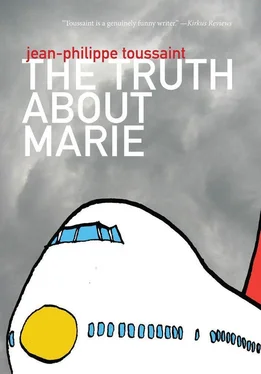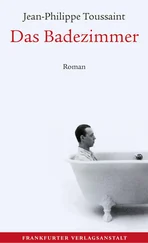But it wasn’t so much the horse’s failure to compete in Tokyo as the circumstances of that failure that had affected Jean-Christophe de G. and cast a pall over the final months of his life. Talk had already spread upon the horse’s return to France, and the scandal was even harder to deny in that it had never been made public. Officially there was no Zahir Affair, there were no charges or accusations, but rumors spoke of illicit substances detected in the horse’s urine (although there was no explicit mention of anabolic steroids, there was talk of masking agents capable of preventing their detection), and of suspicions that there were ties between the horse’s trainer and a nefarious Spanish veterinarian who moved in cycling and weightlifting circles (where he no doubt benefited greatly from his veterinary knowledge). The official reason given for Zahir’s dropping out of the Tokyo Shimbun Hai, and the long and inexplicable series of sicknesses and complications that followed, cited a root abscess at risk of infection on the day of the race, for which an injection of antibiotics and non-steroidal anti-inflammatory drugs was administered to ward off a potential fever, but nobody believed in good faith that a simple root abscess was sufficient cause to cancel on the spot a trained horse’s tour through Asia, especially one treated daily by a team of veterinary specialists. Jean-Christophe de G. withdrew Zahir from all scheduled races immediately and without explanation, abruptly canceled his participation in the Singapore Cup and the Audemars Piquet Queen Elizabeth II Cup in Hong Kong, fired the trainer without so much as a second thought, and, not without some regret, dismissed the rest of Zahir’s entire crew. Once back in France the thoroughbred was removed from the public eye and sent to the Rabey stud farm in Quettehou, Manche, a Ganay family property, and no one saw the horse for the rest of the year.
After his quick decision to exfiltrate the horse from Japan Monday morning, the day after the race, Jean-Christophe de G. canceled all Zahir’s engagements for the rest of the year and, after some dozen phone calls, arranged for the horse’s return trip to Europe himself, then, fearing complications with customs officials, he called a long-time friend, an official from the JRA, the principal organization for Japanese horse racing. After this conversation, he decided to leave that very day and to personally escort the horse to Europe. Then he called Marie and invited her to join him, which to his great surprise she accepted without question or any display of emotion. But after the call Marie felt suddenly sad, nostalgic, as she realized that she’d be returning to Paris without me, whereas only a week had passed since we’d arrived in Japan together.
The window in her hotel room was wet, streaked with raindrops, dotted lines sliding slowly down the pane, moving in fits and starts, their course interrupted abruptly for no apparent reason. Marie had just hung up the phone and was standing motionless at the large bay window, pensive, looking out gravely at Shinjuku’s administrative center, and she watched the city slowly vanish under the rain and fog, her gaze fixed on nothing in particular, beset with that dreamy melancholy incited by the passage of time, by the realization that something is coming to a close, and that, at every second, little by little, the end is approaching, the final moments of our loves and our lives. Presently, an hour before leaving Tokyo, she thought about me — the person she had broken up with in this very place, in this hotel room we’d shared the night we got to Japan, this room where we’d made love for the last time, this bed where we’d loved each other, this unmade bed behind her where we’d clawed and held each other. Marie would have liked to erase me from her thoughts, now and forever, but she knew quite well this wasn’t possible, that I could appear in her mind at any moment in spite of her wish, subliminally, a sudden immaterial memory of my personality, my tastes, a small detail, my way of perceiving the world, an intimate memory to which I was inextricably bound, for she realized that, even when absent, I continued to live on in her mind, to haunt her thoughts. Of my current location she hadn’t the slightest idea. Was I still in Japan, or had I too changed my plans and taken an earlier flight to Europe? And why hadn’t I tried to contact her? Why hadn’t I called or written since my return from Kyoto? She didn’t know, she didn’t want to know. She didn’t want to have anything to do with me, understand, never — enough of me now.
When, in the afternoon, Jean-Christophe de G. came to pick up Marie at the hotel, she wasn’t ready, her room was still a mess, the bed unmade, her suitcases flung open. Marie had arrived in Japan with three hundred pounds of luggage distributed unevenly among various suitcases and trunks, hatboxes and poster tubes, and, although able to leave some bags and suitcases in Tokyo (the exhibition at the Contemporary Art Space of Shinagawa would last several more months), she’d nevertheless accomplished the feat of returning with as much as she came, if not in weight then at least in volume and number of bags, accumulating, like natural outgrowths of her suitcases, a whole host of sacks and bags of all sizes, in leather, in canvas, or in paper, some sturdy, white, and rectangular, with tan handles of reinforced plastic, others loose and sagging and filled with knickknacks, Takashimaya’s decorative logo of blooming red roses adorning the front, stuffed with presents she received or planned to give, purchases of wild silks and other fine material, obis and trinkets, diverse trifles and souvenirs, paper lanterns, seaweed, tea, in bulk or in individual bags, and even fresh products, small vacuum-packed containers of fugu sashimi kept for the past couple of days in her hotel room’s mini-bar among canned beer and tiny bottles of alcohol. Jean-Christophe de G. called her room twice from the lobby, urging her, tactfully, to make haste, reminding her of how little time they had, the horse and cars were waiting. Marie then had a sudden spurt of energy, dashing back and forth through the room, her arms waving and flitting this way and that as she threw her things together in a rush of panic and goodwill (Marie always made up for being late with a final and sudden push before the finish line, constantly arriving at meetings flustered and out of breath, in a show of haste and with a dramatic entrance, even though often an hour late), then, returning to her natural pace, she finished packing absently, carefully placing her last few things in her bags, looking over her belongings arrayed on the large unmade bed, listlessly placing her bags at the door, without of course closing anything (Marie always left everything open, windows, drawers — it was exasperating, she’d even leave books open, turning them over on her night table next to her when she was done reading).
Waiting for Marie in the lobby, Jean-Christophe de G. settled final matters pertaining to the horse’s transport. He was sitting on a couch in the lobby in the company of four Japanese men, each with a laptop and electronic planner, sent there to replace the former trainer’s crew and to make sure the horse made it to the airport and past customs safe and sound. The four Japanese men all wore navy-blue blazers with pockets bearing the crests of various private clubs and were discussing practical matters with Jean-Christophe de G., shuffling through paperwork and certificates that they studied in a whisper. The horse trailer was parked at the hotel’s entrance, its long and still silhouette could be seen through the lobby’s bay windows, its aluminum body just the same as a rock star’s trailer, with two barred windows on each side, the whole grooved mass gleaming under the golden lights of the hotel’s entrance. The trailer’s back door was open and its ramp lowered to air out the rear and give the thoroughbred some fresh air, and three men in light jackets, hired hands or assistants, stood guard at the trailer’s entrance next to the driver, an old Japanese man in a jumpsuit, starched and gray, opened at the neck to reveal the knot of his tie, smoking a cigarette as he surveyed the hotel’s surroundings. As the wait went on longer than anticipated, the workers took advantage of the lull to change the horse’s water, one of the elegant Japanese men in a navy-blue pocket-crested blazer quietly slipped away into the lobby with a metal bucket, new and shiny, engraved with a blazon and initials, similar in color to the trailer, as though it was an accessory of the latter, one piece of a larger set, and he returned from the lobby with a slow-moving, ceremonial gait, carrying the bucket back to the trailer, his hands covered in clear antiseptic gloves (who knows whether he filled up the bucket in the hotel restroom, or if he had emptied out its contents, manure and urine-soaked hay, thus cleaning out the bed of the trailer).
Читать дальше












